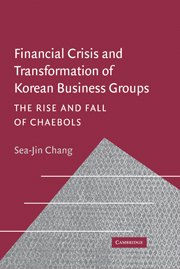Book contents
- Frontmatter
- Contents
- Preface
- 1 Introduction
- 2 The Evolution of Chaebols
- 3 Chaebols' Diversified Business Structure
- 4 Vertical Integration of Chaebols
- 5 The Capital Structure of Chaebols
- 6 Chaebols' Ownership and Governance Structure
- 7 The Restructuring of Chaebols
- 8 Conclusion
- Appendixes
- Notes
- References
- Index
Preface
Published online by Cambridge University Press: 05 January 2010
- Frontmatter
- Contents
- Preface
- 1 Introduction
- 2 The Evolution of Chaebols
- 3 Chaebols' Diversified Business Structure
- 4 Vertical Integration of Chaebols
- 5 The Capital Structure of Chaebols
- 6 Chaebols' Ownership and Governance Structure
- 7 The Restructuring of Chaebols
- 8 Conclusion
- Appendixes
- Notes
- References
- Index
Summary
The Asian Crisis in 1997 affected almost everyone in Korea. Thousands of companies went out of business, and many workers lost their jobs. Foreign investors fled the country, major banks became insolvent, and the government depleted its foreign reserves as the country went bankrupt. This crisis was financially and emotionally painful for me. I had returned to Korea in 1994. At that time, Korea's prospects looked bright. Korean firms continued to grow at a phenomenal rate and had expanded aggressively overseas. Every Korean I met was proud of his country, and businessmen were confident that Korea would soon catch up to Japan, which had served as a role model for Korea. As one of the faithful, I sold my stock in U.S. companies and invested the proceeds in Korean firms. Right after the crisis, however, my net worth in dollars had shrunk to one eighth of what it had been. My wife once teased me, asking how a business school professor could be such a lousy investor. Like many Koreans, I was determined to find out who had ruined my country and stolen my pride.
The widespread consensus was that chaebols were to blame for Korea's downfall. Chaebols, which are powerful groups of affiliated companies that helped catalyze Korea's economic development, have long been admired and criticized. On one hand, people admired them. Korea's top college graduates lined up to work for them.
- Type
- Chapter
- Information
- Financial Crisis and Transformation of Korean Business GroupsThe Rise and Fall of Chaebols, pp. ix - xiiPublisher: Cambridge University PressPrint publication year: 2003

